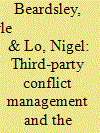| Srl | Item |
| 1 |
ID:
141849


|
|
|
|
|
| Summary/Abstract |
The fighting in some civil wars primarily takes place in a few stable locations, while the fighting in others moves substantially. We posit that rebel groups that do not primarily fight for a specific ethnic group, that receive outside military assistance, or that have relatively weak fighting capacity tend to fight in inconsistent locations. We develop new measures of conflict zone movement to test our hypotheses, based on shifts in the conflict polygons derived from the new Georeferenced Event Dataset (GED) developed by the Uppsala Conflict Data Program (UCDP). Our empirical results provide support for the suggested mechanisms. We find that groups which lack strong ethnic ties and sufficient military strength to compete with government forces in conventional warfare fight in more varied locations. These findings improve our understandings of and expectations for variations in the humanitarian footprint of armed conflicts, the interdependencies between rebel groups and local populations, and the dilemmas faced by government counterinsurgency efforts.
|
|
|
|
|
|
|
|
|
|
|
|
|
|
|
|
| 2 |
ID:
128986


|
|
|
|
|
| Publication |
2014.
|
| Summary/Abstract |
Third-party conflict management, particularly legal dispute resolution (arbitration and adjudication) and mediation, can help improve the willingness of disputants to make asymmetric concessions by ameliorating commitment problems and providing political cover. In both regards, and especially pertaining to commitment problems, mediation has substantial limitations when compared to legal dispute resolution. We develop these arguments and test the observable implications on the Issue Correlates of War data. To get traction on the mechanisms at work, we distinguish between challenger concessions and defender concessions, positing that challenger concessions face the primary hurdle of political cover while defender concessions face the primary hurdle of commitment problems. We find that legal dispute resolution strongly increases the propensity for concessions by both challengers and targets, even major asymmetric concessions. Mediation, on the other hand, only helps increase minor challenger concessions. Also consistent with expectations, mediation best enables asymmetric challenger concessions in the highly salient cases that need the most political cover, and legal dispute resolution best enables asymmetric concessions when there has been a history of failed conflict management attempts that perpetuate mistrust.
|
|
|
|
|
|
|
|
|
|
|
|
|
|
|
|